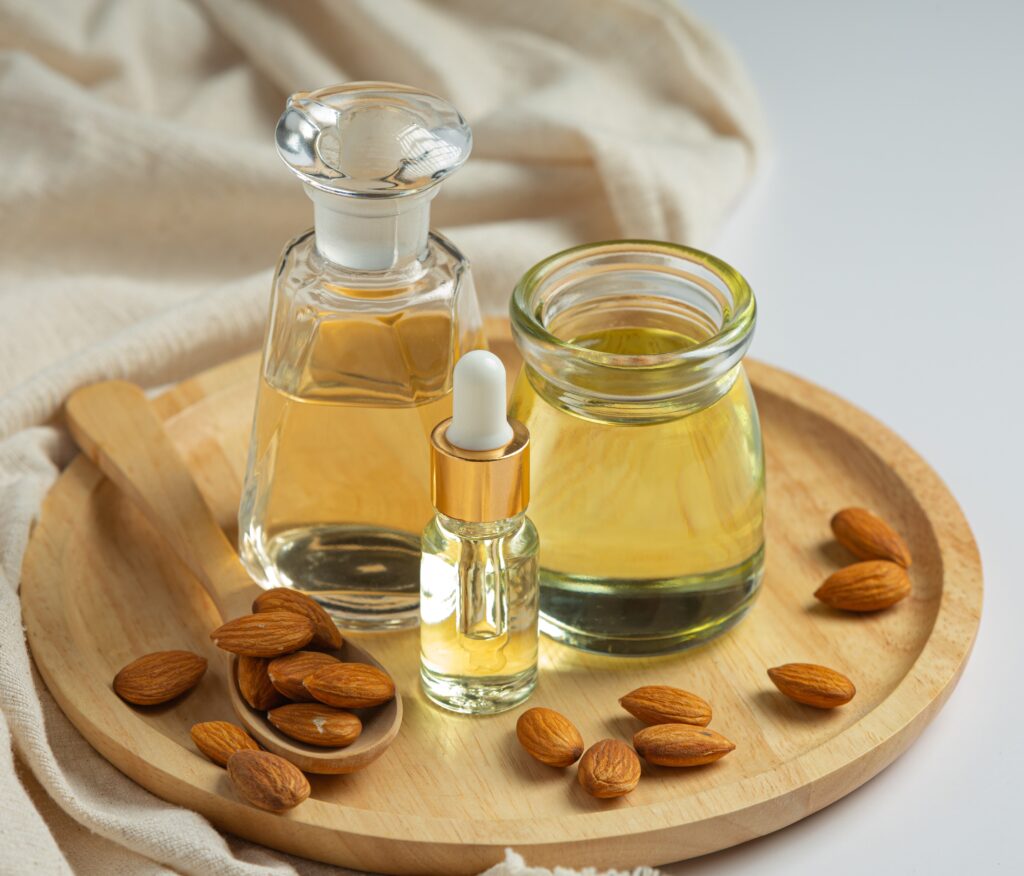When it comes to natural remedies, almond oil stands out as a versatile and nutrient-rich option that has been used for centuries. Whether you’re looking to enhance your skincare routine, boost your hair health, or even improve your overall well-being, almond oil is worth considering. This golden oil is packed with vitamins, minerals, and fatty acids, making it a powerhouse ingredient in the world of natural health and beauty.
In this article, we’ll explore the numerous benefits of almond oil, covering its impact on skin, hair, and general health. By the end, you’ll see why this oil deserves a spot in your daily routine.
What Is Almond Oil?
Almond oil is extracted from the seeds of the almond tree, scientifically known as *Prunus dulcis*. There are two main types of almond oil: sweet almond oil and bitter almond oil. Sweet almond oil, which is more commonly used in cosmetics and skin care, is made from edible almonds. It’s rich in nutrients like Vitamin E, Omega-3 fatty acids, and minerals such as magnesium and phosphorus.
Bitter almond oil, on the other hand, contains compounds that can be toxic if ingested and is primarily used for its fragrance in aromatherapy.
Benefits of Almond Oil for Skin
Deep Moisturization
Almond oil is an excellent moisturizer for all skin types. Its lightweight texture allows it to penetrate deep into the skin, leaving it soft and hydrated without clogging pores. The presence of fatty acids in almond oil helps to lock in moisture, making it a perfect remedy for dry and flaky skin.
Soothes and Heals Irritated Skin
If you struggle with skin irritation or inflammation, almond oil can offer relief. Its anti-inflammatory properties help soothe conditions like eczema, psoriasis, and even sunburn. Applying almond oil to irritated skin can reduce redness and calm the affected area, promoting faster healing.
Anti-Aging Properties
Almond oil is packed with antioxidants, particularly Vitamin E, which plays a crucial role in protecting your skin from oxidative stress and UV damage. Regular use of almond oil can help reduce the appearance of fine lines and wrinkles, keeping your skin looking youthful and radiant.
Lightens Dark Circles
Those persistent dark circles under your eyes can be a thing of the past with almond oil. The vitamin E and retinol in almond oil work together to lighten dark spots and improve skin tone. Gently massaging almond oil under your eyes before bed can help diminish dark circles and puffiness over time.
Improves Skin Tone and Complexion
Almond oil is known for its ability to improve overall skin tone and complexion. The oil’s emollient properties help to smooth the skin’s surface, giving you a more even skin tone. It also helps in fading scars and dark spots, leaving your skin with a natural glow.
Benefits of Almond Oil for Hair
Strengthens and Nourishes Hair
Almond oil is a fantastic source of nutrients that are essential for healthy hair. It’s rich in biotin, magnesium, and fatty acids, which help to strengthen hair strands and prevent breakage. Regular use of almond oil can result in stronger, shinier, and more resilient hair.
Promotes Hair Growth
Massaging your scalp with almond oil can improve blood circulation, which in turn stimulates hair growth. The oil’s high vitamin E content helps to nourish hair follicles, reducing hair loss and encouraging the growth of thicker, healthier hair.
Fights Dandruff and Scalp Conditions
If you’re dealing with dandruff or a dry, itchy scalp, almond oil can help. Its anti-inflammatory properties soothe the scalp, while its moisturizing abilities prevent dryness and flakiness. Regular scalp massages with almond oil can keep dandruff at bay and maintain a healthy scalp environment.
Adds Shine and Softness to Hair
One of the most noticeable benefits of using almond oil on your hair is the added shine and softness. Almond oil acts as a natural conditioner, smoothing the hair cuticles and adding a healthy, glossy finish. Whether you use it as a leave-in conditioner or as a hair mask, almond oil can transform dull, lifeless hair.
Health Benefits of Almond Oil
Supports Heart Health
Almond oil is rich in monounsaturated fats, which are known to be heart-healthy. These fats help to lower bad cholesterol levels (LDL) and increase good cholesterol levels (HDL), reducing the risk of cardiovascular diseases. Incorporating almond oil into your diet can contribute to better heart health.
Aids in Weight Management
The healthy fats in almond oil can also help in weight management. Consuming almond oil in moderation can increase satiety, helping you feel fuller for longer and reducing overall calorie intake. Additionally, almond oil’s high nutrient density ensures that you’re getting essential vitamins and minerals without extra empty calories.
Boosts Immune System
Almond oil contains antioxidants like Vitamin E, which can help boost your immune system. These antioxidants fight off free radicals in the body, reducing oxidative stress and improving your body’s ability to ward off infections and diseases.
Improves Digestive Health
Ingesting almond oil can also benefit your digestive system. The oil acts as a mild laxative, helping to relieve constipation and promote regular bowel movements. Additionally, its anti-inflammatory properties can soothe the digestive tract, making it a good choice for those with digestive issues.
Enhances Cognitive Function
Almond oil is a good source of Omega-3 fatty acids, which are essential for brain health. These fatty acids help improve memory, cognitive function, and overall mental clarity. Including almond oil in your diet may support brain function and reduce the risk of cognitive decline as you age.
How to Use Almond Oil
Skincare Application
To use almond oil on your skin, simply apply a few drops directly to clean skin and massage gently. You can also mix it with other essential oils or add it to your moisturizer for an extra hydration boost.
Hair Care Routine
For hair, warm a small amount of almond oil and massage it into your scalp and hair. Leave it on for at least 30 minutes, or overnight for deeper conditioning, then wash it out with your regular shampoo.
Dietary Use
When consuming almond oil, choose high-quality, cold-pressed sweet almond oil. You can use it as a salad dressing, drizzle it over roasted vegetables, or add it to smoothies for a nutritional boost.
Conclusion
Almond oil is truly a multi-purpose natural remedy that offers a wide range of benefits for your skin, hair, and overall health. Whether you’re looking to moisturize your skin, boost your hair’s shine, or improve your heart health, almond oil can be a valuable addition to your daily routine. With its rich nutrient profile and versatile uses, it’s no wonder that almond oil has stood the test of time as a beloved natural remedy.
FAQs
Can almond oil be used on all skin types?
Yes, almond oil is suitable for all skin types, including sensitive skin. However, it’s always best to do a patch test first to ensure you don’t have any allergic reactions.
How often should I use almond oil on my hair?
You can use almond oil on your hair 1-2 times a week as a deep conditioning treatment.
Can I use almond oil for cooking?
Yes, but make sure to use food-grade, cold-pressed sweet almond oil. It’s great for salad dressings, drizzling over dishes, or even adding to smoothies.
Does almond oil help with hair loss?
Almond oil can help reduce hair loss by nourishing the scalp and strengthening hair strands, but it’s not a cure for hair loss caused by underlying medical conditions.
Is almond oil safe to use during pregnancy?
Almond oil is generally considered safe during pregnancy, but it’s always a good idea to consult with your healthcare provider before using any new products.

